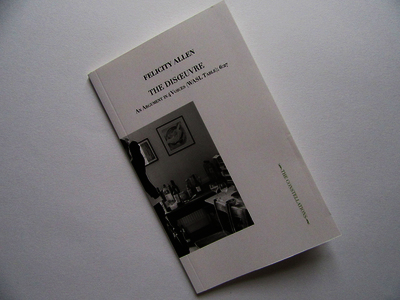KIVLAND, Sharon, ed. (2019). The Disœvre, by Felicity Allen. Ma Bibliotheque. [Edited Book]
Documents
24695:531143
Image (JPEG)
IMG_3804.jpg - Other
Available under License All rights reserved.
IMG_3804.jpg - Other
Available under License All rights reserved.
Download (565kB) | Preview
24695:531144
Image (JPEG)
IMG_3802.jpg - Cover Image
Available under License All rights reserved.
IMG_3802.jpg - Cover Image
Available under License All rights reserved.
Download (510kB) | Preview
Abstract
Some of us were taught to be adaptable, prepared to proxy through others the aspiration we’d been trained in; our children perhaps or our partners, our bosses, or our professors. We’d bend our thinking to accommodate the desires or inflections of others. Or take on extra jobs, maybe studying or working at home at night. Not everyone in the margins was trained this way: distinctions of gender, class, colour might result in being trained in intransigence, mirroring the unswerving convention recognised as discipline that identified the œuvre-producing white male artist
Felicity Allen coins the neologism ‘Disœuvre’ as an alternative to the conventional ‘oeuvre’ produced by art’s heroes. Four voices (material, personal, rational, and cultural) converge to produce a Disœuvre, where the unrecognised work, its continuities of thought and commitment, is situated as coming and going.
‘While this book appears to be fragmentary at first glance, it introduces in a cohesive, suggestive, and evocative manner the powerful concept of the Disœuvre. We are invited to think ourselves into these pages, recognise our own disœuvre, and the experience of creating, having, and living with it. The multiple registers of the diaristic, the reflexive, the authoritative, and the poetic voices are augmented by the visual narrative, and by the presence of the WASL table as the site that recalls the unfolding of Allen’s own disœuvre. It is a delicate and eloquent testament.’
–≥Hilary Robinson
Felicity Allen works with varied forms of production, often collaboratively and over time. Her film As If They Existed, made with Tom Dale. was commissioned by Turner Contemporary in 2015, as part of a residency which explored how women’s work in the arts continues to shift ideas about artistic practice and how to record it. She is the editor of Education (Documents of Contemporary Art), published by MIT/Whitechapel Art Gallery in 2011. Current projects include a durational approach to The Disoeuvre and collaborations with the activist Refugee Tales and the research project People Like You.
More Information
Statistics
Downloads
Downloads per month over past year
Metrics
Altmetric Badge
Dimensions Badge
Share
Actions (login required)
 |
View Item |


 Tools
Tools Tools
Tools![[thumbnail of IMG_3804.jpg]](https://shura.shu.ac.uk/24695/1.hassmallThumbnailVersion/IMG_3804.jpg)

![[thumbnail of IMG_3802.jpg]](https://shura.shu.ac.uk/24695/2.hassmallThumbnailVersion/IMG_3802.jpg)
